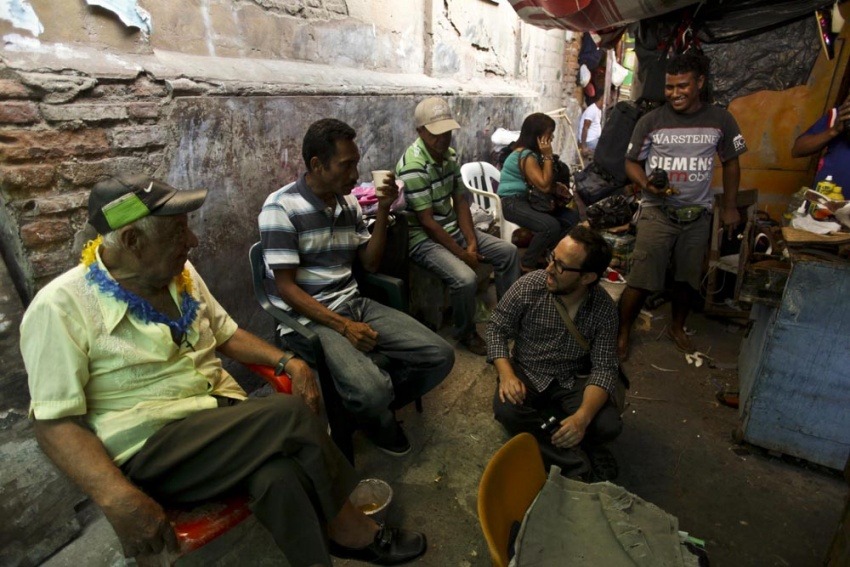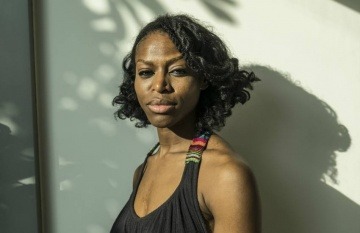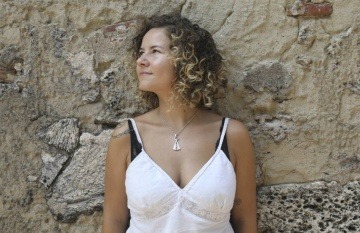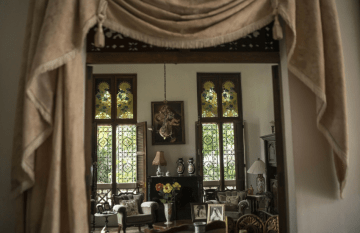The Gabriel García Márquez New Iberoamerican Journalism Foundation -FNPI- and the Ministry of Culture of Colombia, with the support of Cartago Foundation and ProColombia, call for The Gabriel García Márquez Fellowship in Cultural Journalism, from April 26 to May 3, 2017, in Cartagena de Indias, Aracataca and Barranquilla (Colombia). List of chosen journalists.
» About The Gabriel García Márquez Fellowship in Cultural Journalism
Interviewer: You describe seemingly fantastic events in such minute detail that it gives them their own reality. Is this something you have picked up from journalism?
García Márquez: That's a journalistic trick which you can also apply to literature. If you say that there are elephants flying in the sky, people are not going to believe you. But if you say that there are four hundred and twenty-five elephants in the sky, people will probably believe you.
• Interview with Peter Stone (winter 1981), The Paris Review Interviews: Writers at Work, Sixth Series (1984), p. 324.
The New Journalism Foundation -FNPI-, created by García Márquez himself in the city of Cartagena de Indias, and the Ministry of Culture of Colombia joined forces in 2012 to establish an international program of training and creation in which reporters from five continents have the opportunity to expand their range in cultural journalism and to explore Colombia and recount, in Spanish and in English, stories of culture which mix the richness of the traditional and the popular with the latest in literature, music, film and visual arts.
The focus of the workshop in 2017 will be an exploration of the relationship between journalism and fiction with García Márquez’s One Hundred Years of Solitude serving as a map on the occasion of the fiftieth anniversary of its publication. Using the tools of cultural journalism including interviews, reportage and personal commentary, participants will consider the role of cultural journalism in both journalism and fiction, in an era in which creator and audience have an increasingly direct contact, facilitated by digital tools. The workshop will study Cartagena de Indias, Baranquilla, and the town of Aracataca, Gabo’s childhood home, which also served as a model for his fictional Macondo.
Cartagena de Indias is the emotional center of the life and work of Gabriel García Márquez, the place where he built a house with the goal of living out his final years, where many of his novels and stories are set, where he began his career as a journalist, and the base for one of his most important legacies: The Gabriel García Márquez Foundation for New Latin American Journalism -FNPI-.
Cartagena was, moreover, one of the principal ports of colonial Spain, from the 16th century until the beginning of the 19th century, and was declared a UNESCO Historic Site in 1984. Barranquilla, at the mouth of the Magdalena River, where he began his journalistic career, was also the center of Gabo’s first inspiration from a group of young writers and friends. The town of Aracataca, where Gabo spent most of his childhood in the home of his maternal grandparents, later served as the model for the fictional Macondo in One Hundred Years of Solitude.
From the purely journalistic point of view, this fifth edition of the Fellowship will also provide the opportunity to exchange experiences and strengthen the skills of the participants both in cultural journalism and journalism in general, while focusing on the important relationship of literature to journalism, as modes of writing about culture, history, and the spirit of a nation and a people.
The Fellows will immerse themselves in the specific practices and cultural dynamics of the three sites, getting to know and reporting on their history, protagonists and present day life, analyzing them from different perspectives and dimensions, working with support material from both local and international experts.
The journalists who will take part in this experience will be guided by colleagues of high professional renown, accompanied by guest experts to help expand both their vision and the criteria by which they choose the facts and characters that will serve as the protagonists of their stories.
With its connection to this annual program, the Ministry of Culture and the other sponsoring organizations highlight the passion of Gabriel García Márquez for journalism, film, literature, music and Caribbean culture.
» How does the Fellowship work?
The participating journalists in the Gabriel García Márquez Fellowship in Cultural Journalism will cover Cartagena de Indias, Barranquilla, and Aracataca, and will work on their stories both in workshop and in private sessions. Several local representatives of local cultural life will also participate in the sessions, giving an opportunity for conversation and exchange with the Fellows. The workshop will be directed by two masters of FNPI, Héctor Feliciano (Puerto Rico) and Jonathan Levi (United States), accompanied by international guests Taiye Selasi (Ghana/United States) and Daniel Samper Pizano (Colombia) as well as local and national experts as Ariel Castillo (Colombia).
A total of 15 journalists from all over the world will work over six days to produce a significant piece of journalistic reportage that they will previously have committed to publish. The workshop will begin in Cartagena. The group will then move to Barranquilla and Aracataca by land, and will return to Cartagena to close the workshop.
The spoken sessions will be held in English, which requires that all participants have a working knowledge of the language. In cases when the sessions are held in Spanish, there will be simultaneous translation. Fellows may write in Spanish or English.
» Participants
15 editors or journalists with experience covering culture topics and writing fiction, with a mastery of English language, a mínimum of three years of journalistic experience, and who work or publish in print or digital media. 5 places will go to Colombian journalists, 5 to other Latin Americans, and 5 to journalists from other continents.
To demonstrate command of the English language, finalists will be interviewed by telephone or Skype.
The 15 chosen journalists will work for 8 days in Cartagena, Barranquilla, and Aracataca.
They will also have to bring with them to the workshop:
• A portable computer.
• Examples of the journalistic outlet for which they work or in which they publish.
IMPORTANT: Each of the journalists selected to participate in the Fellowship must consult the authorities of their own country about any visa or other requirements for entering Colombia. We recommend doing this as far in advance as possible, as it can take many days. .
» Requirements for Application
Applicants must fill out the registration form before 1:00 p.m. of march 21st, through the FNPI system and attach:
• An autobiography, maximum 800 words (in English, Portuguese or Spanish), stressing both journalistic and literary experience and reasons for wanting to attend the fellowship.
This essay is the most important criterion for selection and should be prepared prior to completing the form online. Conventional resumes will not be taken into account.
• A letter of support that certifies employment with the media for which you work. In the case of freelancers, we require certification from some media that you have published there during the previous six months. In both instances, the letter must specify that the media is committed to publishing the articles you produce during the fellowship, as long as they comply with their editorial policies.
• A piece of reporting or other article, especially on cultural issues, of your authorship that has been published in the past year.
NOTE: Only online registration is valid, made via the registration form on the website of FNPI. Registrations by fax, email or postal mail, will not be accepted.
» Registration and support
The participants will not have to pay a registration fee for this activity. They will also receive the following financial support:
• International medical insurance during the term of the fellowship.
• Accommodation in a single room during the term of the fellowship.
• Roundtrip ticket, economy class.
• Refreshments daily, a welcome dinner.
• Working materials.
» How to Apply
To register for The Gabriel García Márquez Fellowship in Cultural Journalism, please follow the steps listed below:
1. Clic here.
2. Sign in with your email and password.
If you do not have an account in FNPI you must complete the registration data on the following link: archivo.fnpi.org/registro/
3. Click on "to Apply".
4. Fill out the form displayed and attach the required documents mentioned in Requirements for Application.
5. Click on Send.
If you have questions about the registration process, please write to becagabo@fnpi.org
» Directors
Jonathan Levi (United States)
Following graduation from Yale University, Levi received a Mellon Fellowship to study at Cambridge University, where in 1979 he co-founded the literary magazine Granta and served as U.S. Editor until 1987.
After leaving Granta, Levi divided his time between writing and producing. He is the author of two novels, A Guide for the Perplexed, and the recent Septimania. His plays and operas have been performed in the US, England, Italy, the Netherlands and Georgia. Levi’s many short stories and articles have been published in Granta, Condé Nast Traveler, GQ, Terra Nova, The Nation and The New York Times.
Levi divides his time between New York and Rome, where he writes for The International New York Times and Condé Nast Traveler and serves as Artistic Advisor for the Zaubersee Festival in Luzern, Switzerland. He also runs a workshop in Cultural Journalism at Under The Volcano in Tepoztlán, Mexico.
Héctor Feliciano (Puerto Rico)
Feliciano has a degree in History and Art History from Brandeis University, a Master´s degree from the School of Journalism at Columbia University and a Ph.D. in Comparative Literature from the University of Paris. He has written for El País, Clarín, The Washington Post, Los Angeles Times, and the magazines Etiqueta Negra, Letras Libres and El Malpensante.
His book The Lost Museum - The Nazi Conspiracy to Steal the World's Greatest Works of Art, is the result his extensive investigative journalism for which the School of Journalism at Columbia University in New York awarded him a fellowship in the prestigious National Arts Journalism Fellowship Program (NAJP). He was also a member of the Presidential Commission on Holocaust Assets in the United States formed during the presidency of Bill Clinton.
In 1999 he organized the first symposium on cultural property and patrimony at Columbia University, and in 2016 was president of VII CILE, the International Congress on the Spanish Language in San Juan, Puerto Rico. He is a member of the Advisory Board of FNPI, where he has directed workshops on cultural journalism. He has been the editor and editorial director of the books The Best Latin American Journalism and Gabo, Journalist.
» Guest Masters
Taiye Selasi (Ghana/United States)
Taiye Selasi was born in London, raised in Boston, living in Rome, to parents of Ghanaian and Nigerian origin. The author has been mentored by Toni Morrison and endorsed by Salman Rushdie. She is Yale- and Oxford-educated. Her 2005 essay What Is An Afropolitan? gave a face to a class of sophisticated, cosmopolitan young Africans who defy downtrodden stereotypes. Her story The Sex Lives of African Girls was published in Granta in 2011. After the publication of her first novel, Ghana Must Go, she was named to the Hay Festival's Africa39 list of 39 Sub-Saharan African writers under the age of 40 "with the potential and talent to define trends in African literature."
Daniel Samper Pizano (Colombia)
Colombian journalist and writer, born in 1945. Samper studied law in the Pontifical Xavierian University (Bogotá) and obtained a Master's Degree in Journalism at Kansas University, United States. He was also awarded a Nieman Fellowship by Harvard University (1979-1980), the first Latin American to get it.
Since 1986 he lives half-time in Madrid (Spain). He has been editor, columnist and editor of the newspaper El Tiempo de Bogota since 1964; Editor of Cambio16 magazine (Spain) and collaborator of numerous newspapers and magazines in Spain and Latin America. Lecturer and university professor, is member of the Colombian Academy of the Spanish Language. He is the author of more than forty books, including humor articles, essays, journalismn anthologies, short stories and novels. He has also written scripts for well-known tv comedies and serials. .
» Guest Expert
Ariel Castillo (Colombia)
Considered one of the best connoisseurs and interpreters of the literature of Gabriel García Márquez, Castillo Mier has dedicated to present in diverse cultural and academic scenarios his vision on the Colombian writer and the meaning of the words in his work. He is Philologist of the Universidad del Atlántico (Barranquilla, Colombia) and Doctor in Hispanic Letters of the Colegio of Mexico (México). In 2014 he was part of the First Gabriel García Márquez Chair in Barranquilla with the paper 'The Feminine Universe of Gabriel García Márquez'. He has been coordinator of the Chair of the Observatory of the Colombian Caribbean and is currently a professor of Literature at the Universidad del Atlántico. He is co-editor of the books 'Meira Delmar, Poetry and Prose', 'Memory without guardians to Rafael Escalona' and 'Rafael Escalona. Charms of a life in songs'. In 2002, he won the National Journalism Prize Simón Bolívar for the best cultural article.




